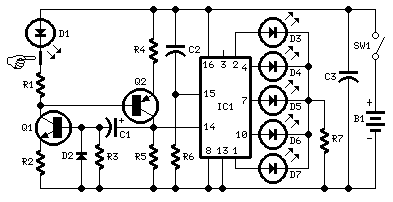The counter is advanced by one touching a wire of the LED
Suitable for many applications
Circuit diagram:
Parts:
R1_______________1K 1/2W Resistor
R2,R4____________1K8 1/4W Resistors
R3______________68K 1/4W Resistor
R5_______________4K7 1/4W Resistor
R6______________10K 1/4W Resistor
R7_____________680R 1/4W Resistor
C1______________47µF 25V Electrolytic Capacitor
C2,C3__________100nF 63V Polyester Capacitors
D1__________Red LED 2mm. Axial SMD types preferable (See text)
D2___________1N4148 75V 150mA Diode
D3 to D7________LED Any color, shape and size (See text)
Q1____________BC550C 45V 100mA Low noise High gain NPN Transistor
Q2____________BC560C 45V 100mA Low noise High gain PNP Transistor
IC1____________4017 Decade counter with 10 decoded outputs IC
SW1____________SPST Toggle or slide switch
B1_______________9V PP3 Battery
Clip for PP3 Battery
Comments:
This project can be used in a wide range of applications, limited only by the imagination of the home constructor.
 In
practice, the circuit consists of a small LED mounted in some
accessible place, having part of the cathode terminal exposed (see
Figure at right) so that tapping the small LED with one finger, you come
into contact with the cathode terminal: this action will turn the LED
on.
In
practice, the circuit consists of a small LED mounted in some
accessible place, having part of the cathode terminal exposed (see
Figure at right) so that tapping the small LED with one finger, you come
into contact with the cathode terminal: this action will turn the LED
on.
The LED will stay lit for about two seconds and then shut off. Meanwhile, the IC counter will advance one position and this is repeated every time you touched LED1 with a finger.
The LED will stay lit for about two seconds and then shut off. Meanwhile, the IC counter will advance one position and this is repeated every time you touched LED1 with a finger.
Circuit operation:
Q1 and Q2 form a complementary monostable having a time delay of
about 2 seconds. Its sensitivity is so high that it can be triggered
simply by touching the Cathode wire of the LED D1 by a finger. The
monostable output, present at Q2 Collector, clocks the Decade counter
IC1 which, in turn, drives one at a time the LEDs D3 through D7.
In the circuit diagram 5 LEDs are shown, but since the IC has ten outputs, any number of LEDs up to 9 can be used. The 0 output (pin #3 of IC1) should have no LED connected, to signal that no counting occurred.
The counter is reset at pin #15 by C2 and R6. This will occur every time you restart the circuit through SW1.
In the circuit diagram 5 LEDs are shown, but since the IC has ten outputs, any number of LEDs up to 9 can be used. The 0 output (pin #3 of IC1) should have no LED connected, to signal that no counting occurred.
The counter is reset at pin #15 by C2 and R6. This will occur every time you restart the circuit through SW1.
Notes:
- D1 should be mounted close to the rest of the circuit to avoid false triggering signals pick-up.
- The stand-by current drawing of this circuit is negligible.


No comments:
Post a Comment